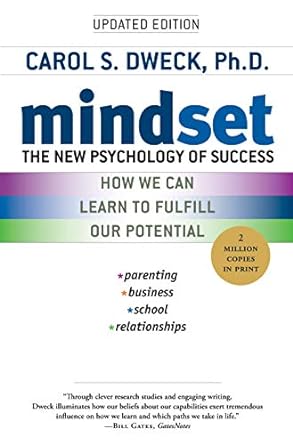Much of the book examines the differences between these two mindsets and how they impact every aspect of life. Dweck provides compelling research showing how mindset influences achievement, relationships, willpower, and success. A key point is that mindsets are not fixed – they can be changed. By understanding mindset, we can work to cultivate a growth mindset in ourselves and others.
The fixed mindset assumes that intelligence and talent are static. People are smart or they aren’t, talented or not. Challenges and effort are seen as fruits of inadequacy. Failure is seen as defining. Those with a fixed mindset care first and foremost about appearing to be smart and talented at all times. Growth and learning take a backseat to looking talented.
The growth mindset assumes that talent and intelligence can be developed. Challenges provide opportunity for growth. Failure is seen as a chance for improvement. Those with a growth mindset care first and foremost about improving. They see effort as the key to mastery. Criticism is embraced as a tool for getting better. The success of others is seen as inspirational.
These differing mindsets play out in childhood. Children praised for being smart develop a fixed mindset. They avoid challenges to protect their label of being smart. Children praised for effort develop a growth mindset. They seek challenges that help them learn. Praise in general should focus not on the child’s fixed traits but on the process of learning and improvement.
Relationships are also impacted by mindset. Those with fixed mindsets care more about being right than learning. They are threatened by and competitive with people who outperform them. Those with growth mindsets appreciate when others share insights that help them learn. Growth mindset relationships are more trusting and satisfying.
Mindsets impact willpower. When facing setbacks, those with fixed mindsets lose focus more easily. Their internal dialogue is more negative. Those with growth mindsets stay motivated in the face of difficulty. Their internal dialogue remains positive and they maintain focus on improvement.
Finally, the book examines mindset in the contexts of sports, business, and academics. In all cases, a growth mindset fosters the behaviors needed for achievement – seeking input, learning from failures, practicing deliberately, remaining determined through setbacks. Mindset offers perspective on how so many great achievers across fields fulfilled their potential through these growth-oriented processes.
The key takeaway is that mindset has a profound influence on achievement and fulfillment. By understanding mindset, we can work to cultivate a growth orientation within ourselves and others. We can structure environments that reinforce growth and learning rather than fixed abilities. Mindset gives us leverage to motivate ourselves and others to strive, improve, and persist in the face of challenges. It teaches us to value the process of growth over worry about measuring innate fixed talent.
